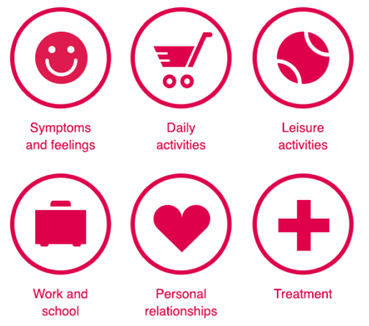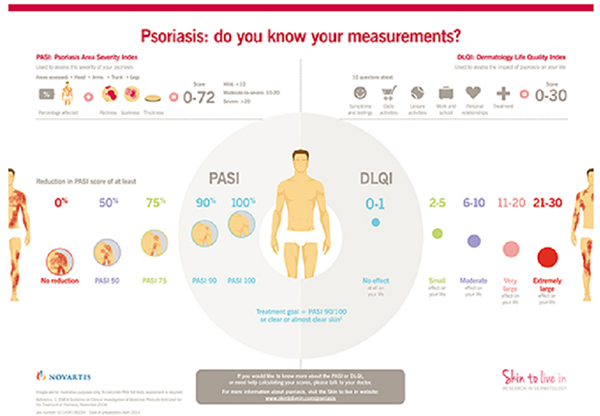Keeping up with psoriasis
Keeping track of things is an important part of everyday life. Whether it is our spending habits, our work or our diet, tracking things over time can help us to adapt and adjust, to make sure we are in control.
It’s the same if you have psoriasis…you just have one more thing to keep track of! Psoriasis varies from person to person; it is therefore important to know how your psoriasis is affecting you, so you can take control.
It all starts with how…because you can’t manage what you don’t measure!
Start with the skin
Plaques, flakes, scaling…the physical signs of psoriasis are obvious, but how to measure and keep track of them may not be.
PASI, or the Psoriasis Area and Severity Index, is a tool that your doctor can use to determine the severity your psoriasis. It takes into account all of the characteristics of psoriasis – the redness, thickness and scaling of plaques – as well as the percentage of the body that is affected, to calculate a severity score. This score is a number from 0 (meaning you are not affected at all) to 72 (meaning you are severely affected).1 In reality, scores above 30 are rare.2
The higher your PASI score, the more severe your psoriasis ─ but as you know, it is not just your skin that is affected.
More than meets the eye
You should never underestimate the impact of psoriasis on how you feel ─ it is just as important to measure the effects of psoriasis on your day-to-day life, as well as the severity of your physical symptoms. The DLQI, which stands for Dermatology Life Quality Index, is a simple 10-question questionnaire that does just that. These questions cover a variety of topics, from symptoms and feelings to daily activities and personal relationships, to uncover how psoriasis is affecting different aspects of your life.3
A DLQI score is a number from 0 to 30; the higher your score, the greater the impact psoriasis is having on your quality of life.3
But why do scores like your PASI and DLQI matter?
Living well with psoriasis
Because the severity of psoriasis can change over time and from person to person, tracking your psoriasis can help give you and your doctor an important insight into how psoriasis is affecting you. Using simple tools like PASI and DLQI to keep track of your condition can allow you and your doctor to make helpful changes, so that you can live as well as you can with psoriasis.
Don’t know where to start? Check out our ‘Do you know your measurements?’ infographic on Pinterest.
You can also talk to your doctor to find out if they are tracking your psoriasis at the moment or if this is something that they can help you to start.
Take the first step towards controlling your psoriasis, by knowing your measurements and knowing why they matter.
You can also talk to your doctor to find out if they are tracking your psoriasis at the moment or if this is something that they can help you to start.
Take the first step towards controlling your psoriasis, by knowing your measurements and knowing why they matter.











Join one of our communities
and connect with other people with severe skin conditions
Psoriasis facebook community